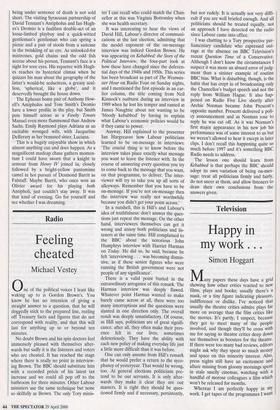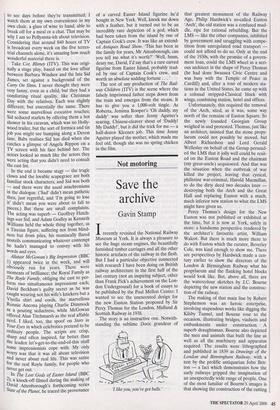Television
Happy in my work . . .
Simon Hoggart
Many papers these days have a grid S -lowing how other critics reacted to new f lms, plays and books; usually there's a mask, or a tiny figure indicating pleasure, indifference or dislike. I've noticed that usually the theatre critics admire plays far more on average than the film critics like the movies. It's partly, I suspect, because they get to meet many of the people involved, and though they'll be cross with me for saying so theatre critics deep down see themselves as boosters for the theatre. If there were too many bad reviews, editors might ask why they spent so much inoneY and space on this minority interest. Also, press nights still have an excitement and allure missing from gloomy mornings spent in stale smelly cinemas, watching with a handful of morose colleagues a film which won't be released for months.
Whereas I am perfectly happy in filY work. I get tapes of the programmes I want to see days before they're transmitted; I watch them at my own convenience in my own chair, a glass of wine to hand, able to break off for a meal or a chat. That may be why I am so Pollyanna-ish about television. Considering that around 840 hours of TV is broadcast every week on the five terres- trial channels alone, it's amazing how much wonderful material there is.
Take Cor, Blimey (ITV). This was origi- nally a stage play, based on the love affair between Barbara Windsor and the late Sid James, set against a background of the Cony On films. I never thought they were very funny, even as a child, but they had a comforting ritual quality, like Christmas Day with the relatives. Each was slightly different, but essentially the same. There were some marvellous evocative touches; Sid seduced starlets by offering them a hot shower in his caravan, which was no Holly- wood trailer, but the sort of formica and tin job you might see bumping along a Devon lane. Babs realises Sid has died when she catches a glimpse of Angela Rippon on a TV screen with his face behind her. The actors looked so much like the actors they were acting that you didn't need to consult the cast list.
In the end it became stagy — the tragic clown and the lovable scapegrace are both familiar stock characters, and Sid was both — and there were the usual anachronisms in the dialogue. (`Sad' didn't mean pathetic then, just regretful, and `I'm going to lose a' didn't mean you were about to fall to pieces.) But' these are small complaints. The acting was superb — Geoffrey Hutch- ings was Sid, and Adam Godley as Kenneth Williams held the whole thing together, as a Tiresias figure, suffering not from blind- ness but from piles, his maniacally flared nostrils communicating whatever contempt he hadn't managed to convey with his words and eyes. Alistair McGowan's Big Impression (BBC 1) appeared twice in the week, and will obviously run for years. There were moments of brilliance; the Royal Family as The Royle Family, obliging the cast to per- form two simultaneous impressions each; David Beckham's guilty secret as he was Caught wearing not his wife's knickers but a Viyella shirt and cords, the marvellous Ronnie Ancona playing Charlie Dimmock as a pouting seductress, while McGowan Offered Alan Titchmarsh as the real affable nerd. I liked, too, the spoof on Stars in Your Eyes in which celebrities pretend to be ordinary people. The scripts are crisp, sharp and often inspired, far better than the leaden let's-get-to-the-end-of-this stuff some impressionists cope with. My only Worry was that it was all about television and never about real life. This was satire for the real Royle family, for people who never get out. In The Lost Gods of Easter Island (BBC 2), a knock-off filmed during the making of David Attenborough's forthcoming series State of the Planet, he traced the provenance of a carved Easter Island figurine he'd bought in New York. Well, knock me down with a feather, but it turned out to be an incredibly rare depiction of a god, which had been taken from the island by one of Captain Cook's crew. It was like an extend- ed Antiques Road Show. `This has been in the family for years, Mr Attenborough, can you tell me what it's worth?"Well, hmm, deary me, David, I'd say that's a rare carved figurine from Easter Island, probably trad- ed by one of Captain Cook's crew, and worth an absolute sodding fortune . . '
The test of any production of The Rail- way Children (ITV) is the scene where the falsely imprisoned father steps down from the train and emerges from the steam. It has to give you a 1,000-volt tingle. As Roberta, Jemirna Rooper's 'Oh daddy, my daddy' was softer than Jenny Agutter's searing, Chinese-cleaver shout of `Daddy! My Daddy!', but it did the trick for me — a half-dozen Kleenex job. This time Jenny Agutter played the mother, which made me feel old, though she was no spring chicken in the film.



























































 Previous page
Previous page